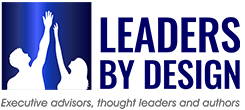Strategic Leadership in a Global Arena
One of the most critical—and often overlooked—leadership challenges in today’s dynamic global landscape is staying open to growth. Even the most seasoned executives must remain coachable and adaptable as the demands of leadership continue to evolve.
As executives rise in an organization, they may become increasingly insulated from candid feedback. Yet, the most effective leaders actively seek input from trusted peers, HR partners, or executive coaches to sharpen their impact, expand their perspective, and lead with greater clarity, agility, and purpose.
At Leaders By Design, we help executives improve their leadership performance with a focus on navigating change, cultural intelligence, self-empowerment and personal development, emotional intelligence and self-awareness, strategic thinking, and decision-making skills. We bring a unique blend of insight and expertise, delivering high-impact coaching that’s both strategic and deeply personalized.
- We help cultivate executives for the CEO position by implementing the best leadership development practices for C-Suite executives.
- We discuss the implications of neuroscience for men and women effectively leading together.
- We improve team efficiency by helping clients gain self-awareness of their own work style and that of others with whom they engage.
- We help leaders develop and enhance critical relationships with their board stakeholders.

Leadership Coaching
At the executive level, leadership can often feel isolating, with decisions carrying significant consequences for the organization. CEOs and senior leaders benefit greatly from the perspective of a trusted advisor. Leaders By Design provides a confidential space for reflection, enabling executives to assess their leadership style, strategies, and vision. This partnership allows for clearer decision-making and a more strategic approach, enabling leaders to navigate challenges and drive long-term success with confidence.

Onboarding Coaching
Successfully transitioning into a new role, whether through promotion, lateral movement, or a new position within a different organization, requires strategic foresight and meticulous execution. Research indicates that a significant number of new leaders struggle within the first three months in a new job; however, this challenge can be mitigated with a deliberate approach. Understanding your business imperatives and identifying key stakeholders critical to your success are foundational steps. Engaging with an executive advisor provides invaluable, objective counsel during this critical period and beyond.

Board Governance
As a CEO, one of the most pivotal relationships you can cultivate is with your board chairperson and board members. Understanding their communication needs and performance expectations is essential for driving alignment, fostering trust, and ensuring long-term success. While managing an organization can make nurturing these relationships challenging, it is an investment that pays significant dividends. Equally important is recognizing the visibility and impact of your key staff members in board interactions—the quality of their presentations and presence matters.

Career Coaching
Effective leadership requires the ability to listen, empathize, and inspire teams to maintain productivity and morale. These skills are crucial during organizational change. Emotional flexibility—balancing authority with collaboration—is key to navigating transformation. Knowing when to drive change and when to integrate diverse viewpoints ensures agility through the ups and downs. A trusted advisor can help executives stay aligned with their strategic vision and team needs.
Learn More
Transformational Leadership
In today’s rapidly evolving business landscape, even the most seasoned leaders must continuously adapt. Staying ahead of industry shifts and managing complex change is non-negotiable. Failure to evolve leadership behaviors can carry significant consequences, including stagnation or exit from the organization. Engaging a trusted, confidential advisor isn’t a sign of weakness; it’s a strategic move to identify blind spots, navigate change, and drive meaningful results.
Leaders by Design